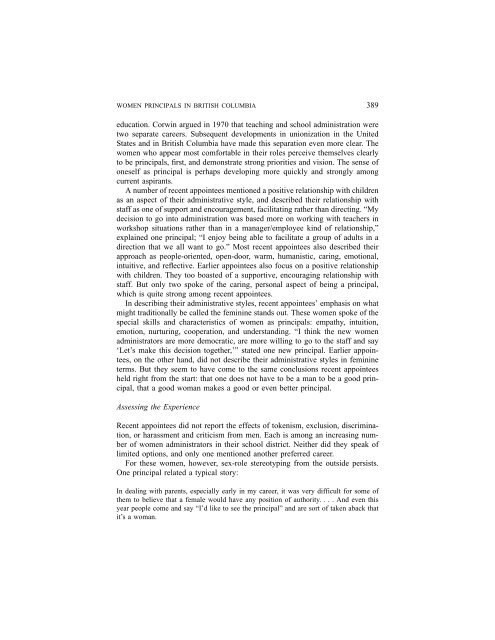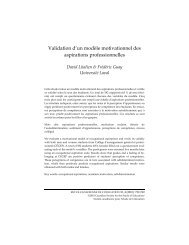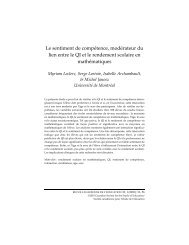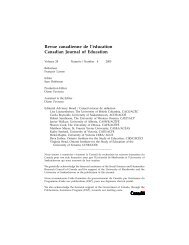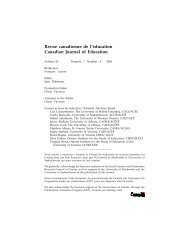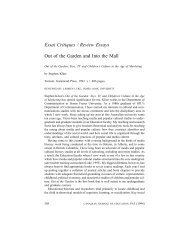Mireille Falardeau et Michel Loranger Le choix de stratégies ... - CSSE
Mireille Falardeau et Michel Loranger Le choix de stratégies ... - CSSE
Mireille Falardeau et Michel Loranger Le choix de stratégies ... - CSSE
You also want an ePaper? Increase the reach of your titles
YUMPU automatically turns print PDFs into web optimized ePapers that Google loves.
WOMEN PRINCIPALS IN BRITISH COLUMBIA 389<br />
education. Corwin argued in 1970 that teaching and school administration were<br />
two separate careers. Subsequent <strong>de</strong>velopments in unionization in the United<br />
States and in British Columbia have ma<strong>de</strong> this separation even more clear. The<br />
women who appear most comfortable in their roles perceive themselves clearly<br />
to be principals, first, and <strong>de</strong>monstrate strong priorities and vision. The sense of<br />
oneself as principal is perhaps <strong>de</strong>veloping more quickly and strongly among<br />
current aspirants.<br />
A number of recent appointees mentioned a positive relationship with children<br />
as an aspect of their administrative style, and <strong>de</strong>scribed their relationship with<br />
staff as one of support and encouragement, facilitating rather than directing. “My<br />
<strong>de</strong>cision to go into administration was based more on working with teachers in<br />
workshop situations rather than in a manager/employee kind of relationship,”<br />
explained one principal; “I enjoy being able to facilitate a group of adults in a<br />
direction that we all want to go.” Most recent appointees also <strong>de</strong>scribed their<br />
approach as people-oriented, open-door, warm, humanistic, caring, emotional,<br />
intuitive, and reflective. Earlier appointees also focus on a positive relationship<br />
with children. They too boasted of a supportive, encouraging relationship with<br />
staff. But only two spoke of the caring, personal aspect of being a principal,<br />
which is quite strong among recent appointees.<br />
In <strong>de</strong>scribing their administrative styles, recent appointees’ emphasis on what<br />
might traditionally be called the feminine stands out. These women spoke of the<br />
special skills and characteristics of women as principals: empathy, intuition,<br />
emotion, nurturing, cooperation, and un<strong>de</strong>rstanding. “I think the new women<br />
administrators are more <strong>de</strong>mocratic, are more willing to go to the staff and say<br />
‘L<strong>et</strong>’s make this <strong>de</strong>cision tog<strong>et</strong>her,’” stated one new principal. Earlier appointees,<br />
on the other hand, did not <strong>de</strong>scribe their administrative styles in feminine<br />
terms. But they seem to have come to the same conclusions recent appointees<br />
held right from the start: that one does not have to be a man to be a good principal,<br />
that a good woman makes a good or even b<strong>et</strong>ter principal.<br />
Assessing the Experience<br />
Recent appointees did not report the effects of tokenism, exclusion, discrimination,<br />
or harassment and criticism from men. Each is among an increasing number<br />
of women administrators in their school district. Neither did they speak of<br />
limited options, and only one mentioned another preferred career.<br />
For these women, however, sex-role stereotyping from the outsi<strong>de</strong> persists.<br />
One principal related a typical story:<br />
In <strong>de</strong>aling with parents, especially early in my career, it was very difficult for some of<br />
them to believe that a female would have any position of authority. ...An<strong>de</strong>ven this<br />
year people come and say “I’d like to see the principal” and are sort of taken aback that<br />
it’s a woman.


